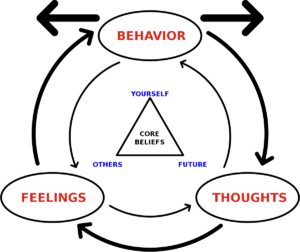People sometimes imagine themselves as the main character in a movie. Almost everyone has done this. The main character syndrome is when someone thinks that they are playing the lead role in a fictional version of their life, for example, as if they were in a movie.
Contents
What is Main Character Syndrome?

Main Character Syndrome (MCS) is a condition that affects writers who create stories with a single, dominant character. MCS can be caused by several factors, including an over-reliance on the main character to drive the plot forward, fear of letting other characters take center stage, or inexperience in developing multiple characters arcs.
The term protagonist syndrome is based on books and TV shows. A protagonist means the main character in a book or TV show. There is usually a main character in the story. All of the other parts of the story either affect or help them. If you have the main character syndrome, you think that your life is a movie. You are in everything and everyone else is just there to support you. Talk to people outside of your family about your problems. People who have this syndrome act like narcissists.
Some people feel that they are the protagonist of their own life. It’s not always a bad thing, but it can be when individuals become self-absorbed or believe that they are more essential than others. If you suffer from the main character syndrome, you may fail to notice others around you. You might believe they’re simply part of your narrative.
Because it may have a negative influence on your life, you must be aware of the symptoms of main character syndrome. If you believe that you or someone else has main character syndrome, keep reading. Learn how to determine whether you have it and how to try and overcome it.
Symptoms of Main Character Syndrome

- The inability to view oneself as anything other than the main character of one’s own life.
- A lack of empathy for anyone seen as supporting characters in your narrative (friends, coworkers, family members).
- An overinflated sense of self-importance and entitlement on account of playing such a lead role in one’s own life story.
- Excessive fantasizing and daydreaming about one’s heroic exploits.
- A chronic need for external validation to feel like the main character of one’s life is living up to expectations.
Causes Of Main Character Syndrome
There are many possible causes of MCS.
- Some writers may develop the syndrome due to an over-reliance on the main character to drive the plot forward. This can be a result of a lack of experience in developing multiple characters arcs, or fear of letting other characters take center stage.
- Others may suffer from MCS due to an excessive need for external validation. This may stem from a lack of self-confidence or an overinflated sense of entitlement caused by playing such a lead role in one’s own life story.
- Still, others might develop MCS due to narcissistic tendencies, believing that they are more important than everyone else and therefore deserving the starring role in their own lives.
Diagnosis Of MCS
If you feel like you identify with any of the symptoms listed above, it’s important to seek professional help. A therapist can help you work through your issues and develop a plan to start sharing the spotlight more equally with other characters in your life story. With time and patience, you can overcome MCS and start writing a more well-rounded story that will draw in your readers and keep them invested until the very end.
Treatment and Overcoming MCS
- The first step in overcoming MCS is acknowledging that you have a problem. Seek out friends and family members who can help you realize that you may be suffering from MCS.
- Once the problem has been identified, it’s important to start sharing the spotlight with others as much as possible. Remember: everyone is a supporting actor in someone else’s life story, so try to view yourself less as an indispensable main character and more as a bit player in the drama of life.
- Some people who write stories focus too much on their main character. They don’t give other characters any attention. But you can fix this problem if it happens to you.
- To avoid writing a one-sided story, try giving the main character more than one goal. For instance, rather than having them pursue their career goals at all costs with little regard for anyone who gets in their way, has they also struggle to maintain friendships or romantic relationships that are just as important to them as advancing their professional life.
- This will create a more well-rounded story in which the main character is not the only one driving the plot forward. It also allows for more opportunities for your readers to identify with and root for them.
- In addition, make sure that your main character has flaws. No one is perfect, so show your readers that even the most put-together characters have some skeletons in their closet.
- Finally, don’t forget to give your main character a love interest! Many stories revolve around the pursuit of romantic fulfillment, so make sure you include it as an integral part of the plot. Just be careful not to let this overshadow everything else going on in your protagonist’s life—remember: everyone is a supporting actor in someone else’s story.
Therapy Treatment
There are many therapies available for those suffering from MCS.
Some common treatments include Cognitive Behavioral Therapy (CBT), which helps you to identify and change the thoughts and beliefs that contribute to your main character syndrome, family therapy, which can help you repair any damage done by your dysfunctional relationship with your main character, and group therapy, which provides a safe and supportive environment in which you can share your experiences with other people who are also struggling with MCS.
Therapies for Main Character Syndrome

There are many therapies available for those suffering from MCS.
Some treatments are Cognitive Behavioral Therapy, which helps people to identify and change their thoughts about themselves. This helps to stop the main character syndrome. Family therapy is for relationships with family members who have been hurt by the main character syndrome. Group therapy meets with other people who have MCS too.
- CBT: Cognitive Behavioral Therapy (CBT) is a treatment that can help you with your main character syndrome.
- Family therapy: Family therapy helps to repair the damage done by dysfunctional relationships between parents and their main characters.
- Group therapy: Group therapies provide safe spaces in which people who are struggling with MCS can share their experiences without fear of judgment or persecution.
How to prevent your main character from taking over the story?
The best way to avoid writing a one-sided story is by giving more than one goal for your protagonist. Your readers will relate better if they can see themselves in the main character’s struggles, so try creating some secondary goals that are just as important—if not more!—than their main objective.
It’s also important to give your protagonist some flaws—no one is perfect, after all! Show that even the most put-together characters have skeletons in their closet by humanizing them and making them more relatable. You don’t want readers writing you off for being too preachy or moralistic either, so make sure you include some romance in your story to keep things fun and light!
Conclusion
Main Character Syndrome is a phenomenon in movies, TV shows, and books where the main character has all of the best lines. The rest of the cast is just there to support their hero. It’s not surprising that this idea can also happen with other things. For example, when you are watching your favorite movie or reading a good book, it feels like everything they say is what you want to hear. But don’t let these feelings cloud your judgment when making decisions about who should be leading your business! Remember that everyone in the team has something valuable to contribute. Make sure that no one gets left out by creating opportunities for them to shine. You’ll also find that employees will feel more engaged with work because they know how important their contributions are to the company’s overall goals.
If you are looking for affordable Online Counseling MantraCare can help: Book a trial therapy session


